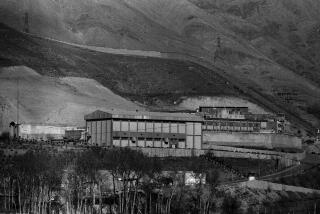Arms Scandal May Make Job Tougher : Waite Returns to Beirut on New Hostage Mission
- Share via
LARNACA, Cyprus — Anglican Church envoy Terry Waite returned to Beirut on Monday in a renewed effort to gain the release of five Americans and other foreigners being held hostage in Lebanon.
Waite’s return to Lebanon, on a chartered Middle East Airlines jet, marked the first time he has been to Beirut since a stream of disclosures began in Washington about the Reagan Administration’s covert dealings with the Iranian government over the American hostages.
Waite, who is the personal envoy of Robert A. K. Runcie, the Archbishop of Canterbury, and an experienced hostage negotiator, has denied any connection with the secret U.S. arms supplies to Iran or with negotiations between Iranian officials and the former White House national security adviser, Robert C. McFarlane.
But in the two months since the disclosures of the arms deals began, Iran has said publicly that its terms for interceding with the Lebanese kidnapers of the Americans include settlement of Iran’s outstanding financial claims and delivery of weapons ordered by the late Shah Mohammed Reza Pahlavi of Iran.
Political observers believe that the disclosure of the arms-for-hostages negotiations may make it more difficult for outsiders such as Waite to negotiate with the kidnapers in Lebanon, who are believed to be Shia Muslim fundamentalists loyal to Iran.
Hopes have been raised that the Iranians will send a positive message to the West by helping with the release of one or more of the hostages in Lebanon, now that financial talks with the United States, in The Hague, have made progress and an Iranian offensive against Iraq in the Persian Gulf War has scored some initial successes.
Church Not Optimistic
But the Anglican Church was considerably less optimistic in tone Monday than it has been on any of Waite’s previous visits to Beirut. A church spokeswoman in London said only that Waite “wants to see if he can achieve anything more in relation to the hostages.”
Lebanese reporters who met Waite at the Beirut airport quoted him as saying that “signs have been given to me that now is a reasonable time to come back, and one is able to pursue the contacts and hopefully to be able to try and work a resolution to the problems we face.”
Waite was convoyed by Druze militiamen to the Riviera Hotel in West Beirut. He did not disclose whom he planned to see.
At least three Americans held captive in Lebanon have been released since Waite began shuttling back and forth to Beirut from London. They are the Rev. Benjamin Weir, a Presbyterian minister freed in September of 1985; Father Lawrence M. Jenco, a Roman Catholic priest freed in July of 1986, and David P. Jacobsen, administrator of the hospital of the American University of Beirut, who was released in November.
Held by Islamic Jihad
Islamic Jihad (Islamic Holy War), the Shia group that held the three, says it holds two other Americans, Terry A. Anderson, chief Middle East correspondent of the Associated Press, and Thomas Sutherland, dean of the American University’s School of Agriculture.
In addition, three other Americans were kidnaped in quick succession late last year by groups using a variety of names, but they are all believed to be Iran-connected organizations or individuals.
The three Americans are Frank H. Reed, director of a private school in Beirut; Joseph J. Cicippio, the acting controller of the American University, and Edward A. Tracy, a book salesman.
In interviews last week with the Italian press, Waite spoke in detail about the conditions he faced in his negotiations in Beirut. Describing his mission as a “very dangerous business,” he said he was blindfolded on trips around Beirut, and “then I must conduct discussions while someone has a gun in my back.”
Waite had wanted to travel to Beirut before Christmas, but his travel plans were delayed by fighting in West Beirut between Palestinian guerrillas and the Shia Muslim militia Amal.
More to Read
Sign up for Essential California
The most important California stories and recommendations in your inbox every morning.
You may occasionally receive promotional content from the Los Angeles Times.










